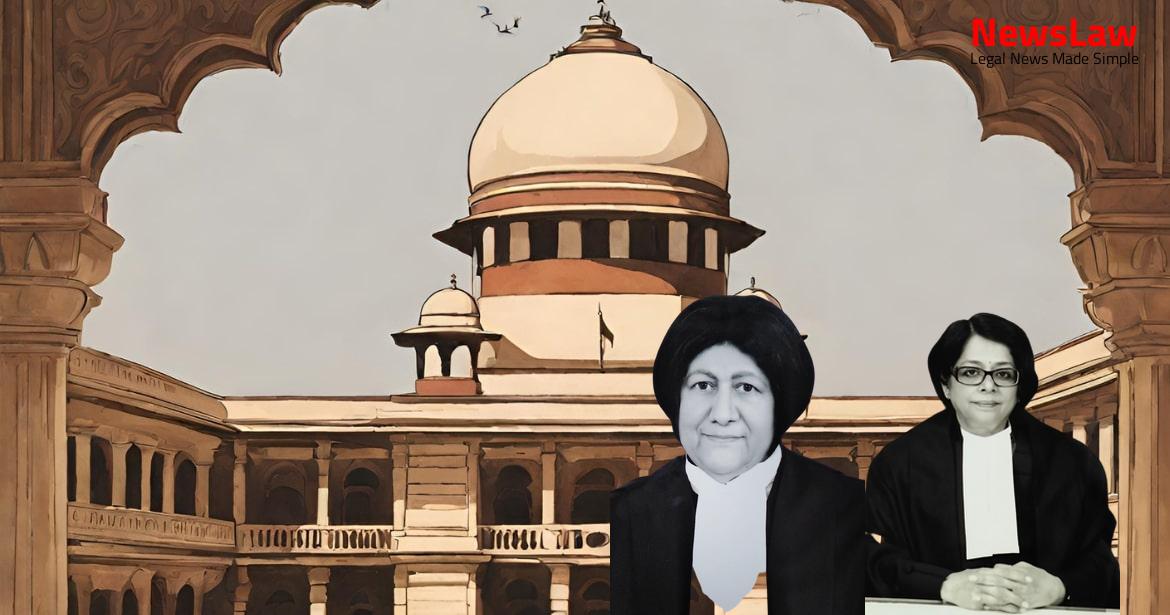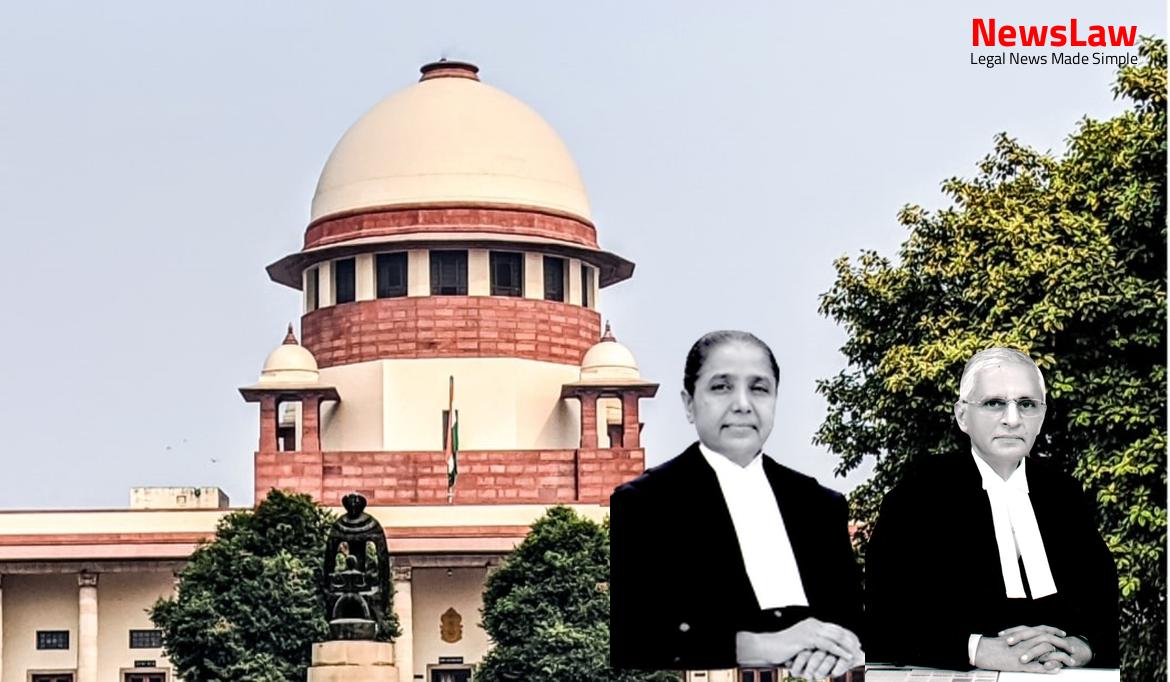The legal case delves into the meticulous legal analysis by the court in harmonizing provisions of the Senior Citizens Act and Protection of Women from Domestic Violence Act. The focus is on striking a balance to protect the rights of vulnerable individuals, ensuring access to judicial remedies for all parties involved. The court’s examination of definitions, procedural aspects, and potential conflicts between eviction and residence orders sheds light on the need for comprehensive legal interpretation to uphold the rights of seniors and women facing domestic violence.
Facts
- The Assistant Commissioner held that the residential house was the self-acquired property of the Third respondent which he subsequently gifted to the Second Respondent.
- The Assistant Commissioner allowed the petition by directing the Fourth respondent to pay a monthly maintenance of Rs.10,000 to his parents and the appellant to vacate the premises.
- The appellant alleges that her father had financed a portion of the purchase of the property.
- The suit regarding the property is pending, and the appellant was residing in the property but was held to have no right or authority.
- The appellant alleges harassment for dowry and was compelled to institute a suit for partition against her father in 2003, which she later withdrew after her spouse allegedly deserted her for another woman.
- The Fourth respondent filed a petition for divorce in 2009, which was allowed in 2013, dissolving the marriage between the appellant and the Fourth respondent.
- The Third respondent purchased the land from the Fourth respondent in 2006 for the same amount paid by the Fourth respondent for the original purchase in 2002.
- The Third respondent subsequently gifted the property to the Second respondent, his spouse, in 2010.
- The Second respondent then filed a suit against the appellant in 2010 seeking an injunction restraining the appellant from interfering with the possession of the property.
- The Assistant Commissioner and Deputy Commissioner allowed the application under the Senior Citizens Act 2007, directing the appellant to vacate the suit premises.
- The High Court held that the appellant’s claim for maintenance and shelter would lie only against the Fourth respondent.
- The Division Bench upheld the decision that the suit premises belonged to the mother-in-law (Second respondent) of the appellant, and the remedy for maintenance and shelter lies against the Fourth respondent.
- The Single Judge noted the claims of the Second and Third respondents that the Fourth respondent had left the house after a matrimonial dispute, and they are currently living in their ‘native place’.
- The Single Judge held that since the marriage between the appellant and Fourth respondent had been dissolved by the Trial Judge, the appellant had no right over the suit premises and her claim for maintenance could only be asserted against the Fourth respondent.
- The Division Bench reiterated the views of the Single Judge and held that the appellant had no cause of action against the Second and Third respondents who owned the suit premises.
- The Division Bench addressed the preliminary objection regarding the jurisdiction of the Assistant Commissioner to direct eviction, stating that they disagreed with the argument that the Assistant Commissioner was powerless to order the appellant’s dispossession.
Also Read: Electoral Malpractices in Mayor Election
Arguments
- (i) The appellant, as the lawfully wedded spouse of the Fourth respondent, cannot be evicted from her shared household under the Protection of Women from Domestic Violence Act 2005, Section 17.
- (ii) The Senior Citizens Act 2007 proceeding was filed by the appellant’s in-laws in connivance with her estranged spouse to deprive her of her matrimonial home.
- (iii) The appellant’s current residential status finding by the Division Bench is disputed, with claims of a fraudulent setup regarding a postal cover.
- (iv) The decree for the dissolution of marriage against the appellant has been set aside by the High Court, and she continues to be in a lawful marriage with the Fourth respondent.
- (v) Allegations that the provisions of the Senior Citizens Act 2007 have been manipulated to defeat the appellant’s rights, including the transfer of premises to evade her claims.
- (vi) Relying on the decision in Satish Chander Ahuja vs Sneha Ahuja, the appellant asserts her right under Section 17 of the PWDV Act 2005 and argues that the authorities under the Senior Citizens Act 2007 had no jurisdiction to order her eviction.
- Both the Second respondent (72 years old) and the Third respondent (82 years old) are senior citizens.
- The suit premises in question was constructed by the Third respondent, the father-in-law of the appellant, and subsequently gifted to the Second respondent, the mother-in-law of the appellant.
- The appellant has been found to have illegally entered into possession and ousted the Second and Third respondents from their property.
- The Second and Third respondents filed an application under the Senior Citizens Act 2007 for eviction and restoration of possession, which was allowed by the authorities and the High Court.
- The Tribunal under the Act has jurisdiction to pass orders to protect the life and property of parents and senior citizens, including eviction orders.
- The Act aims to provide inexpensive and speedy relief to parents and senior citizens.
- The Tribunal is empowered to issue orders for the effective maintenance of parents and senior citizens, including relief against neglect, harassment, and protection of their property.
- Section 23 of the Act confers rights to declare property transfers void and to enforce maintenance rights of senior citizens against transferees.
- The interpretation of the Act should include the power to pass eviction orders for senior citizens, even if not expressly provided, to prevent hardship and ensure effective implementation of the Act.
Also Read: Balancing Power and Transparency: Electoral Bonds Struck Down, Disclosure Mandated
Analysis
- The analysis primarily focuses on the interaction between the Senior Citizens Act 2007 and the Protection of Women from Domestic Violence (PWDV) Act 2005, particularly in relation to shared households and eviction orders.
- The interpretation of the definitions, including ‘shared household’ and ‘maintenance’, as well as the procedural aspects of maintenance tribunals, are discussed in detail.
- The importance of ensuring that both acts are harmoniously construed to protect the rights of vulnerable members of society is emphasized.
- The potential conflict between eviction orders under the Senior Citizens Act and residence orders under the PWDV Act, particularly in cases involving familial disputes, is highlighted.
- The need to balance the rights of senior citizens with those of women seeking protection from domestic violence, and the significance of maintaining access to judicial remedies for all parties involved, is underscored.
- The exhaustive nature of the definitions under the PWDV Act and the limitations on the overriding effect of the Senior Citizens Act are also addressed in the analysis.
- Section 9 of the Act allows for the ordering of a monthly allowance for the maintenance of a senior citizen if they are unable to maintain themselves and their children or relatives neglect or refuse to provide for them.
- Section 23(1) deals with property transfers made by a senior citizen with the condition that the transferee must provide basic amenities and physical needs; failure to do so renders the transfer void due to fraud, coercion, or undue influence.
- Section 23(2) allows a senior citizen’s right to receive maintenance from an estate to be enforced against a transferee with notice of the right, or if the transfer is gratuitous, but not against a transferee for consideration without notice of the right.
- The inclusive element in PART D ensures coverage of households owned or tenanted by the aggrieved person and the respondent jointly or individually, or by either of them with any right, title, or equity.
- The interpretation of the PWDV Act 2005 and the Senior Citizens Act 2007 in the event of a conflict must focus on harmonization rather than excision.
- Previous court cases such as Bank of India v. Ketan Parekh and Pioneer Urban Land and Infrastructure Ltd. v. Union of India have emphasized the principle of harmonizing statutes.
- Section 36 of the PWDV Act 2005, though not a non-obstante clause, should be interpreted harmoniously with the non-obstante clause in Section 3 of the Senior Citizens Act 2007, which operates in a distinct legal sphere.
- A recent judgment by Justice Ashok Bhushan in Satish Chandra Ahuja vs Sneha Ahuja reaffirmed the need for harmonizing conflicting provisions of these Acts.
- The definition of ‘shared household’ in the PWDV Act 2005 is crucial in understanding the rights of individuals in domestic relationships, particularly regarding the right to reside in a shared household.
- The PWDV Act 2005 aims to recognize and secure the housing rights of women, including the right to reside in a matrimonial home or a shared household regardless of the woman’s title or rights in the property.
- Recourse to the summary procedure under the Senior Citizen Act 2007 cannot be used to defeat the appellant’s claim to a shared household.
- A shared household includes where the appellant lived with her husband, even if ownership has been transferred to in-laws or the husband now lives separately.
- The appellant is entitled to protection under the PWDV Act 2005, and her claim to a shared household must be determined by the appropriate forum.
- Evicting the appellant under the Senior Citizens Act’s summary powers does not negate her claim.
Also Read: Recall of Resolution Plan Approval: Legal Analysis
Decision
- The appeal is allowed, and the appellant is entitled to costs quantified at Rs 25,000 from the private respondents.
- The impugned judgment and order of the Division Bench of the High Court of Karnataka affirming the order of eviction against the appellant are set aside.
- The order of the Assistant Commissioner directing the appellant to vacate the suit premises is also set aside.
- The appellant is allowed to pursue her remedies under the PWDV Act 2005.
- The appellant can seek help from District Legal Services Authorities for pursuing her legal remedies and rights.
- IA 111352/2020 for restoration of the electricity connection is allowed, directing the Fourth respondent to restore the connection within two weeks and continue to pay electricity dues in the future.
- There is an order restraining the respondents from forcibly dispossessing the appellant or creating any rights in favor of third parties for a year to enable the appellant to pursue her remedies under the PWDV Act 2005.
- The appellant can move the Court for appropriate orders and interim protections under the PWDV Act 2005.
- The directions regarding electricity restoration and restraining dispossession are in exercise of the Court’s powers under Article 142 of the Constitution.
- Pending applications are disposed of.
- The Second and Third Respondents can make subsequent applications under the Senior Citizens Act 2007 for alteration of the maintenance allowance before the appropriate forum.
Case Title: S. VANITHA Vs. THE DEPUTY COMMISSIONER (2020 INSC 701)
Case Number: C.A. No.-003822-003822 / 2020



